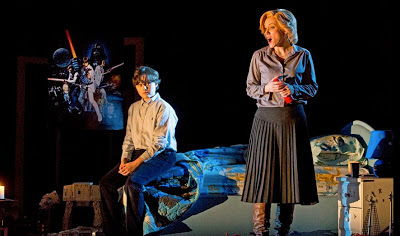New Productions: 6. Wagner: 0.
by
Paul J. Pelkonen
 |
"What do you mean, no horned helmets?"
Ambrogio Maestri is Sir John Falstaff in Robert Carsen's production
of the Verdi opera, premiering at the Met Dec. 6, 2013.
Photo by Catherine Ashmore © 2012 The Royal Opera House in Covent Garden. |
In continuation of its apparent determination to do things differently than every other arts organization in New York City, the
Metropolitan Opera announced its 2013-2014 season schedule at 5pm tonight via the company's website.
It's an unusual schedule this year. Scratch that--it's downright weird. Some unloved productions from recent years return, including the Luc Bondy
Tosca and Mary Zimmerman's controversial "rehearsal" version of
La Sonnambula. There are three operas by Bellini and three operas by Richard Strauss including the mighty
Die Frau ohne Schatten. There are three Russian operas (two of them new productions) and one in Czech.
An article in
the New York Times announced that ticket prices in the expensive seats will drop by 10%, with the burden being placed on Family Circle Balance seats--they go up 20%. Happily, the Rush Program will continue next year.
So what's missing? First of all, there is no Wagner on the schedule. Planned revivals of
Tannhäuser and
Parsifal were reportedly nixed in favor of Dvorak's
Rusalka (starring Renée Fleming) and Berg's
Wozzeck with Thomas Hampson and Deborah Voigt. And there's only two Verdi operas (
Falstaff and a revival of the Vegas
Rigoletto) after last year's slew of seven.
Also anticipated: the return of Shostakovich's
The Nose, Sondra Radvanovsky and Angela Meade alternating in
Norma and a much-needed revival of
A Midsummer Night's Dream. But nothing is more eagerly anticipated than the return of music director James Levine to active duty after a long absence. He's scheduled to conduct a revival of
Cosí fan tutte, the aforementioned
Wozzeck and the new production of
Falstaff.
That's one of
six new productions. And here....they....are:






























